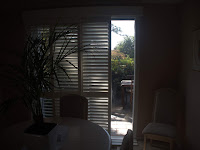 |
| Exposed for Outside |
This
has been an age old challenge, to get both the inside exposure and the outside
scene balanced. Whereas our eyes can
automatically adjust to see detail over a wide range of lighting levels than
even the best digital camera. Also our eyes are constantly looking around the
scene adjusting focus on regions of varying brightness. The image our mind sees
is a reconstruction, and not a direct measure of the light entering our eye(s).
If you are skeptical, read the Cambridge in Colour article
Cameras .vs. TheHuman Eye.
 |
| Exposed for Inside |
The
camera just has to take a single image and because it has a limited dynamic range, and if its using the light meter to choose exposure it is likely to
choose something in the middle. The inside is very dark
compared with the intensity of light outside. Finding a compromised for these
two lighting condition may be too hard and any exposed in the middle will leave
the interior in deep shadow and/or the exterior view bleach out.
You
can override the automatic exposure metering and take two exposure one for
inside and one for the outside view. Then blend them together assuming you have
that capability in your postprocessing software. This is a very common procedure recommend elsewhere on the net, but it can be tedious to do.
Another
alternative is to use the
HDR methodology, which combines different exposures
or can also exploit the extra information in a single RAW photo to expand the
range of tones that can be reproduced. The article I have linked is somewhat old but
does explain the method well. Most post-processing software now has a HDR
capability. I prefer Trey Ratcliff's AuroraHDR and using a set of three EV
bracketed photos (underexposed by 2 stop. Normally exposed & over exposed
by 2 stops) which I have dialed in for the camera to take as a series.
 |
| Bracketed EV Series |
A
word of warning, be careful when tone mapping (or using presets with HDR images
because it is easy to overdo and end up with ugly. faux painted look that is disturbing to most viewers. I prefer to just use the default HDR image (with AI
controlled tone mapping and looks natural) from AuroraHDR and do any further tweaking in my chosen post-processing software, usually using On1 Photo RAW. It is my best solution to
the Indoor and Outdoor View at the same
time dilemma. Most real estate photographers must also believe!
 |
| Final HDR Result |




No comments:
Post a Comment